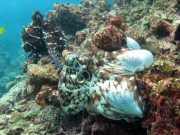Octopus are soft bodied, eight limbed molluscs within the group cephalopod, and are sometimes seen during Koh Lanta dive trips. The eight arms are covered on the inside with rows of suckers which are equipped with chemoreceptors, allowing the octopus to taste what they touch.
As octopus are boneless, they are very flexible and can squeeze through very tight spaces. The only solid structure is their small hard beak made of chitin, which can deliver a nasty bite with venomous saliva when stunning prey. Their beak size will determine what size space they can fit through.
Octopus are masters of camouflage and have specialised skin cells which can allow them to display a variety of colours, patterns and elaborate skin textures. As carnivores, they feed on crustacea, molluscs, fish and other cephalopods.
If under attack from a predator such as a Shark or Moray Eel, an Octopus will release a cloud of black ink. The ink will dull a predator's sense of smell, making the fleeing octopus harder to track. Fast swimmers, they can jet forward by expelling water through their mantles. If all else fails, they can lose an arm to escape a predator's grasp and regrow it later.
Octopus have a short life expectancy of 1-3 years, as males can live for only a few months after mating, and females die shortly after their eggs hatch. The females neglect to eat during the one-month period spent taking care of their unhatched eggs, eventually dying of starvation.
1 species found on this page.



